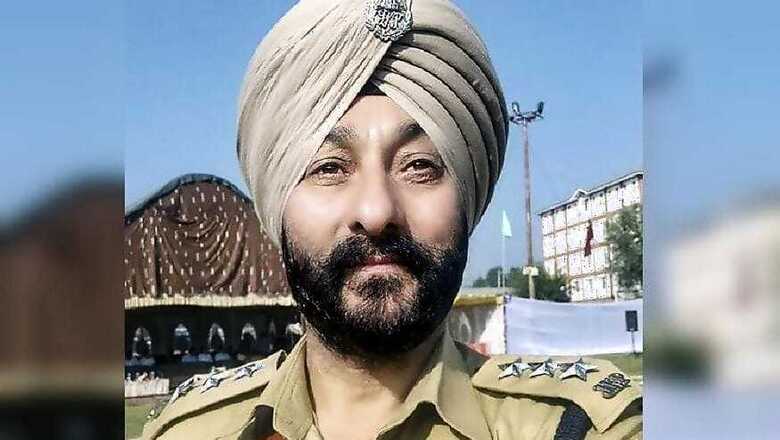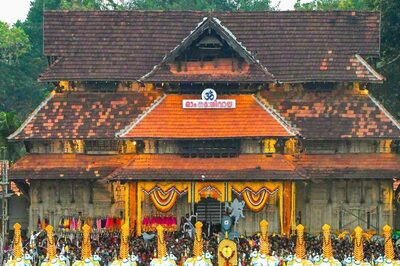
views
New Delhi: Five months before 26/11, a nondescript Srinagar auto-rickshaw driver travelled to Kolkata on one of the most critical missions the Lashkar-e-Taiba’s assault plans involved. His task was to purchase 22 prepaid SIM cards, which the attackers would use to coordinate with each other and the Lashkar commanders in Pakistan when they landed on the beach off Badhwar Park, in Mumbai. Then, he was to hand the cards over to the Lashkar operative who would secret them across the Line of Control.
Except, Mukhtar Ahmad Sheikh wasn’t a Lashkar operative: he was an Indian spy, working for the Jammu and Kashmir Police.
Inside the Intelligence Bureau’s elegant, colonial-era counterterrorism centre in Delhi, computers hummed alive as the cards went active on 26/11 — giving officials graphic, real-time information on the terrorists as they communicated with their handlers in Pakistan.
Police investigators, though, didn’t know of Sheikh’s real job — and couldn’t be told, for fear of compromising other intelligence operations. Instead of being given a medal, he spent three months in a Kolkata prison, treated as a terrorist, before he was quietly bailed out.
For Indians struggling to understand the strange story of Kashmir Deputy Superintendent of Police Davinder Singh, there’s an important lesson in this story: in the sometimes surreal world of counter-terrorism, things aren’t always as they appear.
Is Davinder Singh a traitor; or part of an intelligence-led effort to infiltrate the Hizb-ul-Mujahideen; or, again, a cog in a dark government plot to stage terrorist attacks for political profit?
There’s likely more than meets the eye to this story — but probably much less than the grand conspiracy some are seeing.
The Davinder Singh story is enmeshed with the great tide of anti-India rage which swept over Kashmir in 2016, following the killing of jihadist Burhan Wani. In large swathes of rural Kashmir, the Indian state was simply swept away. In some villages, Pakistani flags were hoisted in public functions held on that country’s independence day, August 14, while jihadist groups held parades. Police armouries were sacked; government offices ceased to function.
In the summer of 2017, police constable Syed Naveed Mushtaq — ‘Naveed Babu’ to his friends — fled his post at a Food Corporation of India warehouse in Budgam, along with four rifles. A few days later, his photograph appeared on Facebook, proclaiming his loyalty to the Hizb-ul-Mujahideen.
Even as the Hizb-ul-Mujahideen hailed Mushtaq’s desertion as an act of heroism, there were some within the terrorist group suspicious of his real intentions and possible links to the police. For its part, police in Shopian made unsuccessful efforts to persuade Mushtaq to surrender, working through his family.
In 2019, though, with other key Hizb-ul-Mujahideen operatives killed — among them Burhan Wani’s one-time associate Lateef Dar — Mushtaq influence on the terrorism landscape in Shopian increased. Last autumn, police put up posters naming him, and associate Rahil Magray for the murder of a truck driver from Rajasthan and fruit trader from Punjab — part of the Hizb-ul-Mujahideen’s efforts to cripple Kashmir’s apple trade.
And then, according to police, a bizarre relationship with Davinder Singh developed — leaving a long trial of questions that aren’t resolved yet.
It isn’t clear, for one, why Mushtaq reached out to the police officer for help with securing safe-houses and storing weapons in the first place. The Hizb-ul-Mujahideen’s network of supporters have long demonstrated competence with tasks like these. Irfan Shafi Mir, a Shopian lawyer arrested along with Singh and Mushtaq, is listed in Jammu and Kashmir police records as a long-standing Hizb-ul-Mujahideen logistics provider.
Nor is there an explanation for where Mushtaq — a small cog in the Hizb-ul-Mujahideen apparatus — might have secured the ₹1.5 million he’s alleged to have paid Davinder Singh for his services. Local Hizb-ul-Mujahideen commanders have never once been found in possession of that kind of money, police records show.
Forty-eight hours before Davinder Singh’s arrest, moreover, a Delhi Police counter-terrorism unit arrested alleged Mushtaq operatives Kifayatullah Bukhari and a juvenile — who News18 is not naming, in compliance with law — near the village of Narwaw in Shopian. The leads for that operation, police say, were provided by an informant who said Bukhari was attempting to procure locally-made firearms from western Uttar Pradesh, on Mushtaq’s behalf.
Leaving aside the more peculiar elements of the story — home-made guns in Uttar Pradesh aren’t known to be effective combat weapons — the arrests would have raised fears that Mushtaq’s network had been penetrated. The rational course of action would have been to terminate his contacts with Davinder Singh, not place himself at the officer’s mercy.
Finally, it remains unclear why Davinder Singh would have decided to personally drive Mushtaq and his associates to Jammu, with plans to go on to New Delhi. Police at checkpoints along Srinagar-Jammu highway aren’t trained to recognise terrorists — meaning there was no real chance of the officer’s help being needed.
The terrorists, moreover, discussed their plans using telephones — which enabled Shopian officers tracking Mushtaq to close in on the car. For Davinder Singh to have allowed this, knowing the high levels of intelligence surveillance of telephone networks, suggests bewildering incompetence, or hubris.
Police sources involved in Davinder Singh’s interrogation have said he’s made the obvious claim that addresses all these questions: that he was acting at the behest of intelligence services, to cultivate Mushtaq, and use him to infiltrate the Hizb-ul-Mujahideen. No intelligence service has, however, endorsed that claim, the sources said — and Davinder Singh hasn’t so far been able to name names.
Inside the Kashmir police’s investigation team, few believe Davinder Singh’s story. Davinder Singh, they believe, simply succumbed to greed. There is compelling evidence, police sources say, that Davinder Singh reached out to Mushtaq, blackmailing him to pay up — or face certain elimination. “We’re pretty certain this wasn’t the first time Singh had run a scam like this,” one officer involved in case said.
This story may well be the truth: the Jammu and Kashmir Police has, after all, arrested several corrupt personnel over the years for colluding with terrorists. Across India, police officers, bureaucrats and military personnel have been prosecuted on similar charges. As the National Investigations Agency interrogates the officer, good answers to the remaining questions might well emerge.
But the story of 26/11 spy Sheikh teaches us not to be too quick to make up our minds which version we believe — until the full facts are known.
From Sheikh’s story, we also know this: the failure to answer questions has often bred conspiracy theories that hurt the credibility of India’s counter-terrorism efforts. Given that Sheikh was, formally, an employee of the Jammu and Kashmir Police, rumours proliferated that the government had a hidden role in the 26/11 plot. No official stepped up to explain what had actually happened. In the end, Pakistani claims that 26/11 was engineered by India gathered momentum.
In the imagination of some in the Indian National Congress — and many more on social media — Singh has, likewise, been cast as a key actor in a dark, secret machine, used by the Indian state to engineer terrorist attacks from Parliament House to Pulwama.
These claims rest on dubious logical firmament: had Singh, in fact, been a key intelligence operator with first-hand knowledge of false-flag terrorist attacks, it’s hard to see how the State would profit by having police hold him — and then hand over the case to the NIA, so he could reveal all in the course of the near-inevitable criminal trial.
In reality, Singh was a bit-player in the Jammu and Kashmir’s Special Operations Group. Following several years of not-especially distinguished service in the police’s Special Operations Group, he was moved to traffic duties, and side-lined by successive Directors-General of Police on suspicion of corruption. His one medal was granted by the state government — not the President of India — for his role in fighting-off a 2018 attack on the Police Lines in Pulwama. That, in turn, led then-Director General of Police SP Vaid to post him at Srinagar airport.
Parliament House attacker Afzal Guru claimed he had been instructed to carry out the plot by Davinder Singh. Guru’s supporters argue the police officer was never investigated. Prosecutors, however, say there was nothing in the evidence they found — which, after all, stood Supreme Court scrutiny — on an allegation they believe was intended to mislead.
In one covert-camera interview secretly recorded by Srinagar-based journalist Parvaiz Bukhari, Singh admitted he had arrested, and even tortured, Guru, long before the attack — but denied any subsequent crimes. There is no obvious reason why the officer would have confessed to one serious criminal offence during what he believed to be a private conversation with a friend, and not the other.
There’s even less foundation to claims that Singh might have had something to do with Pulwama, bar the fact he was posted in the town — as were many other officers — at the time the attack occurred.
Building arguments around the propositions that “anything is possible” leads to a logical cul-de-sac: many of us, after all, could conceivably be the “real masterminds” of the Pulwama attack, or serial killers, or bank-robbers.
That conspiratorialism flourishes, even among institutions which should know better, like the Indian National Congress, tells us something deeply worrying about the credibility of government. The damage is self-inflicted: for decades, politicians and bureaucrats have undermined themselves by habitually evade and elide over the truth, even when telling it would serve their own interests.
In Kashmir, this has engendered a toxic culture of denial: even jihadist atrocities will be met with assertions that Delhi was in fact the puppet-master which pulled the strings.
That’s why it’s important that the story of Davinder Singh be told — transparently and credibly.
















Comments
0 comment